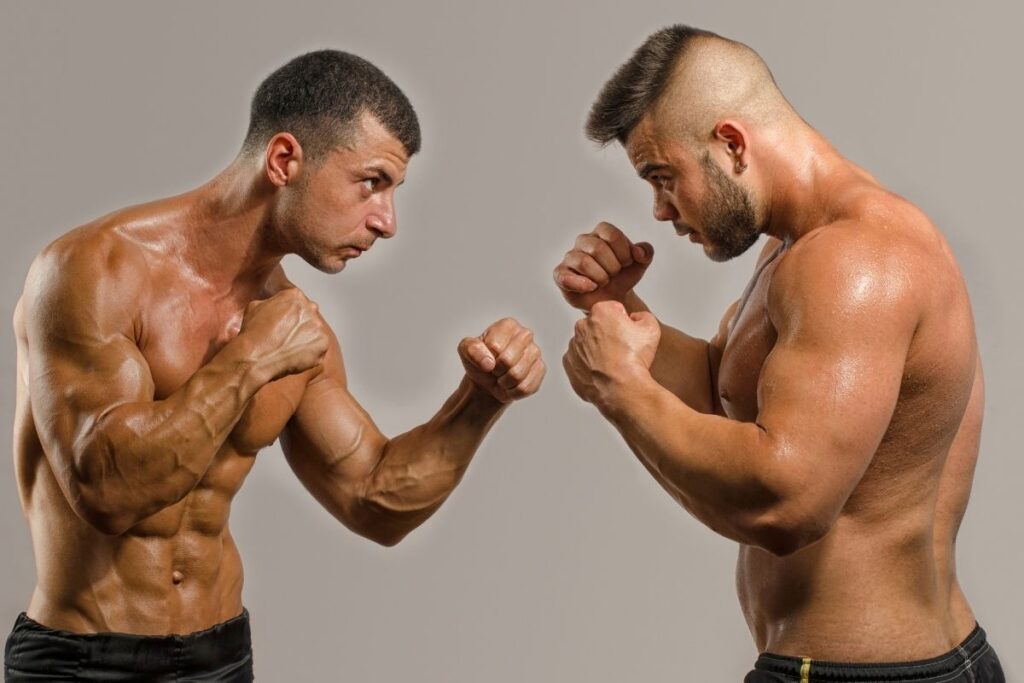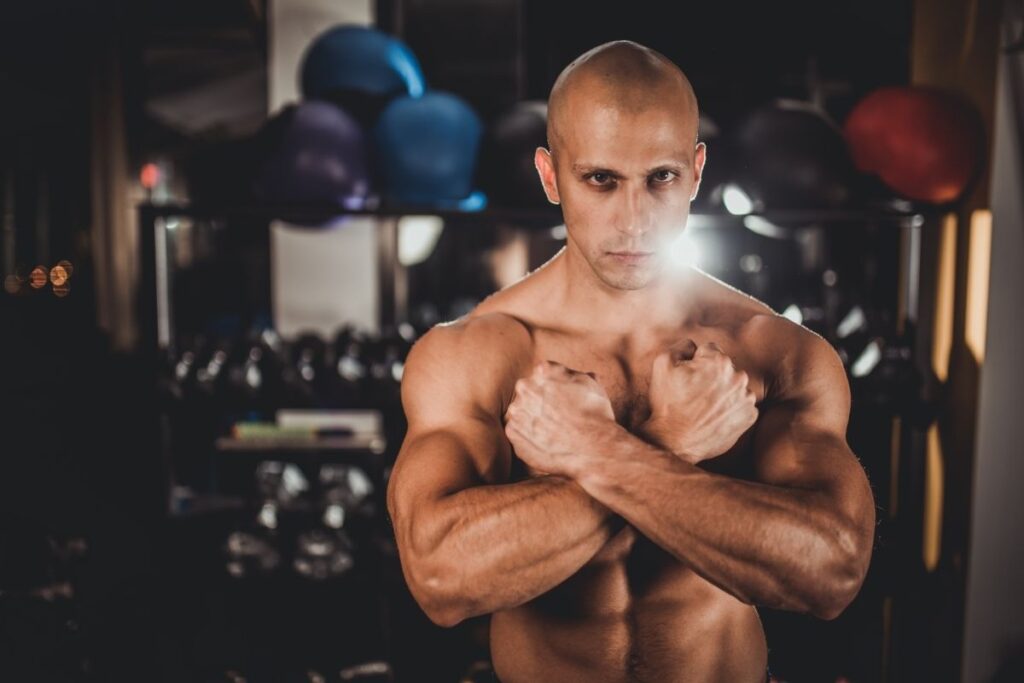Bodybuilders certainly look like people you want to avoid getting in a fight with. The focus on building massive muscles creates a physique that can definitely seem intimidating, and seems perfectly designed for landing a good hard punch.
But bodybuilders actually have a reputation for being bad in a fight. Those large muscles are thought to slow them down, while the focus on aesthetics leads some to think bodybuilders are all muscle, no strength.
The truth is somewhere in between. Bodybuilders aren’t trained for fighting, but they’re likely to still pack some power. In this guide, we’ll be covering whether bodybuilding is beneficial, or detrimental, to fight training.

Can Bodybuilders Fight?
Bodybuilders can use their strength in a fight, but the training isn’t designed for fighting. Bodybuilders focus on the aesthetic side of weightlifting, as well as strength training.
Because of this, many bodybuilders will lack the skills necessary to be a good fighter.
However, the image of bodybuilders as being nothing but show muscles isn’t exactly accurate. Bodybuilders tend to focus on high reps and low weights. This means they don’t gain the same amount of strength as a powerlifter, but they are still gaining strength.
Bodybuilders will also understand a great deal about resting and healing the body, working through pains, and eating for strength.
If the average person decided to challenge a bodybuilder to a fight, the bodybuilder would nearly always come out on top.
However, bodybuilding is its own specific discipline, and it doesn’t train people to become fighters. In a match against a boxer or an MMA fighter, the bodybuilder will find themselves at a disadvantage.
But if a boxer entered a bodybuilding competition, then they’re unlikely to progress very far.
If you try to engage a bodybuilder in a wrestling match, then this is where they’re likely to find some advantage. The close physicality of wrestling is better suited for a bodybuilders' strength.
There’s a pervading myth that bodybuilders can’t fight because they’re slow. And while cardio training isn’t at the heart of bodybuilding, even the most heavily muscled bodybuilders can still have some speed.
But as they aren’t trained for the footwork of boxers and reactions of MMA fighters, they’re likely to seem sluggish in comparison.
RELATED: Everything about bodybuilding
Why Are Bodybuilders Bad Fighters?
Bodybuilding can give you an incredible amount of strength, and an intimidating physique. However, a lack of speed and no actual fight training makes bodybuilders ill-equipped for high level fights.
When you look at the average bodybuilder, the unbelievable physique seems designed for beating people in fights. And honestly, for the most part, a bodybuilder will be able to hold their own.
Strength may not be all you need for a fight, but it certainly helps you to land a punch with impact. We’d caution everyone to think twice before challenging a bodybuilder to a punch up.
However, outside bar scuffles and fist fights, bodybuilders will have few advantages. And if a bodybuilder wanted to become a boxer or an MMA fighter, then they’d need to seriously change their training regime.
A big reason for this is that bodybuilding is focused primarily on building up muscles, and doing so for aesthetic reasons rather than strength.
Fighting also requires a great deal of skill, agility, endurance, and tactical thinking, as well as strength. A bodybuilder may have all those talents, but they aren’t the focus of bodybuilding.
Bodybuilders with no experience in fight training may quickly find themselves outmaneuvered, and knocked out — even if they have a physical size advantage over the trained fighter.
Are There Any Benefits Of Bodybuilding For Fighters?


Yes, some fighters will find benefits from bodybuilding. Bodybuilding can increase overall fitness, and help you gain strength.
Although a bodybuilder may not find the transition to fighting easy, the skills learned from bodybuilding are likely to be useful.
First, bodybuilders focus a great deal on correct form and technique. This has numerous benefits for all types of activity, and it can certainly help in a fight.
A bodybuilder is likely to understand their body well, and have improved coordination, which can lead to a reduced risk of injury.
Bodybuilders focus on growing muscles, which does lead to greater power. The strong abdominal muscles a bodybuilder needs are incredibly useful in fights, where they not only increase power, but help absorb hits.
And as a side effect of training, bodybuilders tend to have impressive grip strength. For MMA fighters, this is an advantage.
What bodybuilding won’t teach is agility, quick reactions, or strategy. A bodybuilder can learn these things, but it would require a whole new training regime.
Can You Combine Bodybuilding And Fighting?
If you’re new to fighting, then bodybuilding can be an excellent way to build up total body fitness, and learn good form. However, both disciplines are time-consuming.
At some point, you’ll need to focus less on bodybuilding, so you can concentrate on your fighting skills.
Bodybuilders spend many hours in the gym, completing intense workouts. Fighters have to do the same. Training both at the same time is likely to lead to fatigue and injury.
You’re likely to find that by trying to train for bodybuilding and boxing or MMA, you end up lacking skill in either discipline.
Those just starting out in fighting might find that bodybuilding is an effective way to improve strength and form. Bodybuilding also puts a focus on recovery, and maintaining the body, a skill that can easily transfer to fighting.
However, if your true passion is fighting, you’re likely to find that at some point you need to lose bodybuilding and focus on a single discipline.
FAQs:
Your questions answered.
Can bodybuilding training improve a person's overall fitness for fighting?
Yes, bodybuilding training can improve a person's overall fitness for fighting. Bodybuilding can increase strength, improve coordination and reduce the risk of injury, which can be helpful in fights. However, to become a good fighter, training that focuses on the specific skills required for fighting is necessary.
Can a bodybuilder fight a boxer?
It is unlikely that a bodybuilder would win in a professional boxing match. Boxing requires a different skill set than bodybuilding, including footwork, reactions, and punching techniques, which are not developed in bodybuilding training.
Can bodybuilders punch hard?
Bodybuilders can certainly have strong punches due to their muscular development, but punching power involves more than just muscle size. Factors such as technique, speed, accuracy, and timing also play a significant role in generating power behind a punch. Additionally, bodybuilders may not have the same level of training and experience in combat sports as professional fighters or martial artists.
Are big muscles good for fighting?
While having large muscles can certainly contribute to physical strength and power, they are not necessarily a guarantee of fighting ability. Fighting involves a combination of various skills, including technique, speed, agility, endurance, and strategy.
Final Thoughts
Bodybuilders can fight, but it isn’t what they’re trained for. However, their impressive strength, particularly in the abdominals and grip, can have numerous advantages.
A bodybuilder may not have the agility and tactics of a trained fighter, but the strength and endurance learned for bodybuilding can adapt to different fighting styles.
Most average people will struggle in a fight with a bodybuilder. If you’re completely new to fighting, then bodybuilding can help you build the strength you need to excel. But the skills aren’t exactly transferable, and most fighters will be better off focusing on their own discipline.
